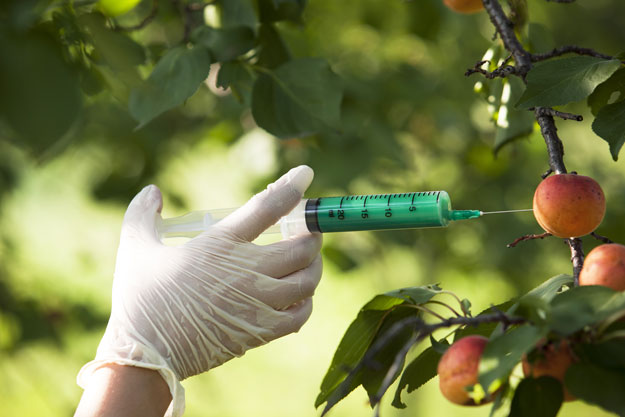Wondering what happens to GMOs when they enter your body? A study carried out by scientific journal, Plos One, proved that instead of breaking down in our system, DNA fragments from GMOs linger in our body, causing diseases and illnesses. Read the rest of the story to find out more!
DNA from GMOs Stays In Our Body

Despite claims made on their Food Safety page by GMO-giant, Monsanto, that DNA from genetically modified foods breaks down in our system in the same way normal, natural food does , it has been proven that DNA from GMO's doesn't break down and instead, through an unknown process, exits the digestive track to circulate in other bodily systems such as circulatory and respiratory. The presence of GMOs is associated with lower counts of friendly intestinal bacteria and inflammatory diseases such as colorectal cancer and inflammatory bowel disease.
The best way to avoid GMOs is to grow your own fruits and vegetables! This Garden Tower will turn your compost into vibrant fruits and veggies that are healthy, flavorful, and au natural.

The Impact of GMO Foods in Our Bodies
A recent study published by journal Plos One combines the analysis of 4 independent studies that involved more than 1,000 human samples and tested the assimilation process of GMOs in our internal body. The analysis of these combined studies found that DNA fragments derived from GMO foods are capable of transferring their genes directly into our bloodstream where they are circulated throughout our bodies. Normally, when digested, food begins to break itself down into nucleic and amino acids but it was found that GMO DNA retains its large structures and, because of this, can pass from the digestive tract into the blood stream and then into other systems, such as the circulatory and respiratory systems. The mechanism through which they enter the circulatory system is yet unknown.
GMO's have an adverse effect on the human body and, when consumed in large quantities can pose several health risks such as an increase in inflammatory diseases such as colorectal cancer, adenoma (a colonic polyp that forms before colorectal cancer sets in) and inflammatory bowel disease; a decrease in beneficial gut flora which can lead to lowered metabolism, obesity and other digestive diseases such as IBS; and, in animals has been shown to reduce fertility and cause sterility if ingested for long periods of time. GM foodstuffs such as corn and meat can pose other health risks such as liver cancer and the like.
The effects of GMO foods on the human body weren't considered an interesting topic of study as they were a gray area in which only government-regulated agencies and food corporations such as Monsanto had control over. Monsanto, often called “the world's most evil corporation” was established in 1901 by John Francis Queeny and Olga Mendez Monsanto. The first product the company released was saccharin, an artificial sweetener that was also deemed to be poisonous by the government. While the government sued Monsanto, ordering it stop its production of chemical food additives, they lost and Monsanto continued to produce artificial food ingredients. Through their history as a corporation, Monsanto was responsible for producing many chemicals such as Agent Orange, aspartame, and many more; they are also known for creating GMO crops and rBGH (the Synthetic Bovine Growth Hormone).
As indignation over the increased use of GMOs in food began to grow, Monsanto attempted to cover their tracks by stating that the human body is able to process GMOs in the same way it processes non-GMO foods. That is to say, GMO foods were said to break down in the digestive tract. But that has been proven to not be the case. So, our next question is: what does this mean for us? For those who like to cook their own meals and partake in the wonder that is food?
What's Going To Happen To Us?

With all the press that local, organic food has been getting, it can be easy to pass it off as the newest health fad or a successful marketing campaign, but there is truth to the claims that organic food is safer, healthier and better tasting. It has been proven that organic food retains more nutrients and health benefits than food that has been sprayed with pesticides or injected with growth hormones. That, coupled with the findings of this study, show that through and through organic or locally-grown food is the way to go. While we love going to farmer's markets, the most important (and liberating) thing we've ever done is grow our own food! Born out of a desire for fresh produce and a heftier wallet, we began growing our own fruits, herbs and vegetables. Because this isn't an option for everyone, we do encourage you foodies out there to buy local, go organic and, if possible, grow your own food.
Health is the way of the future and if this study proves anything, it's that we need to start becoming conscious buyers. Every item your purchase is a vote, so let's start voting with our forks and demanding healthy, fresh (non-mutant) food!
Stay GMO-free with this Guide on Local and Organic Produce and Vertical Gardening Ideas for Small Spaces!
That’s all, folks! If you enjoyed our 18 Scrumptious Monkey Bread Recipes, let us know in the Comments section below. We love hearing your feedback and comments; we also love sharing, so if you have an amazing monkey bread recipe, we’d love to hear about it and try it for ourselves! HomemadeRecipes.com was founded to create an online community where foodies, epicureans and chefs can share recipes and learn new ones! We need your help, however, in creating this community where you can come, share and learn. If you love to cook, love food or have some great recipes and ideas you’d like to share with us, shoot us an email and make sure to stay in touch on Facebook, Twitter, and Pinterest! We’re always looking for contributors and want to hear from you.
Sign up for our daily newsletter here!
Do you have Instagram? Don’t forget to follow @HomemadeRecipesOfficial.
Click here to Like Us on Facebook.
Click here to Follow Homemade Recipes on Pinterest
I can’t get the link for “18 Scrumptious Monkey Bread Recipes” to work. Could you please send it to me at my email address?
I have found your site very informative and bookmarked numerous recipes for healthy eating.
Thank you,
Stephanie M.
http://homemaderecipes.com/how-to-make-monkey-bread/